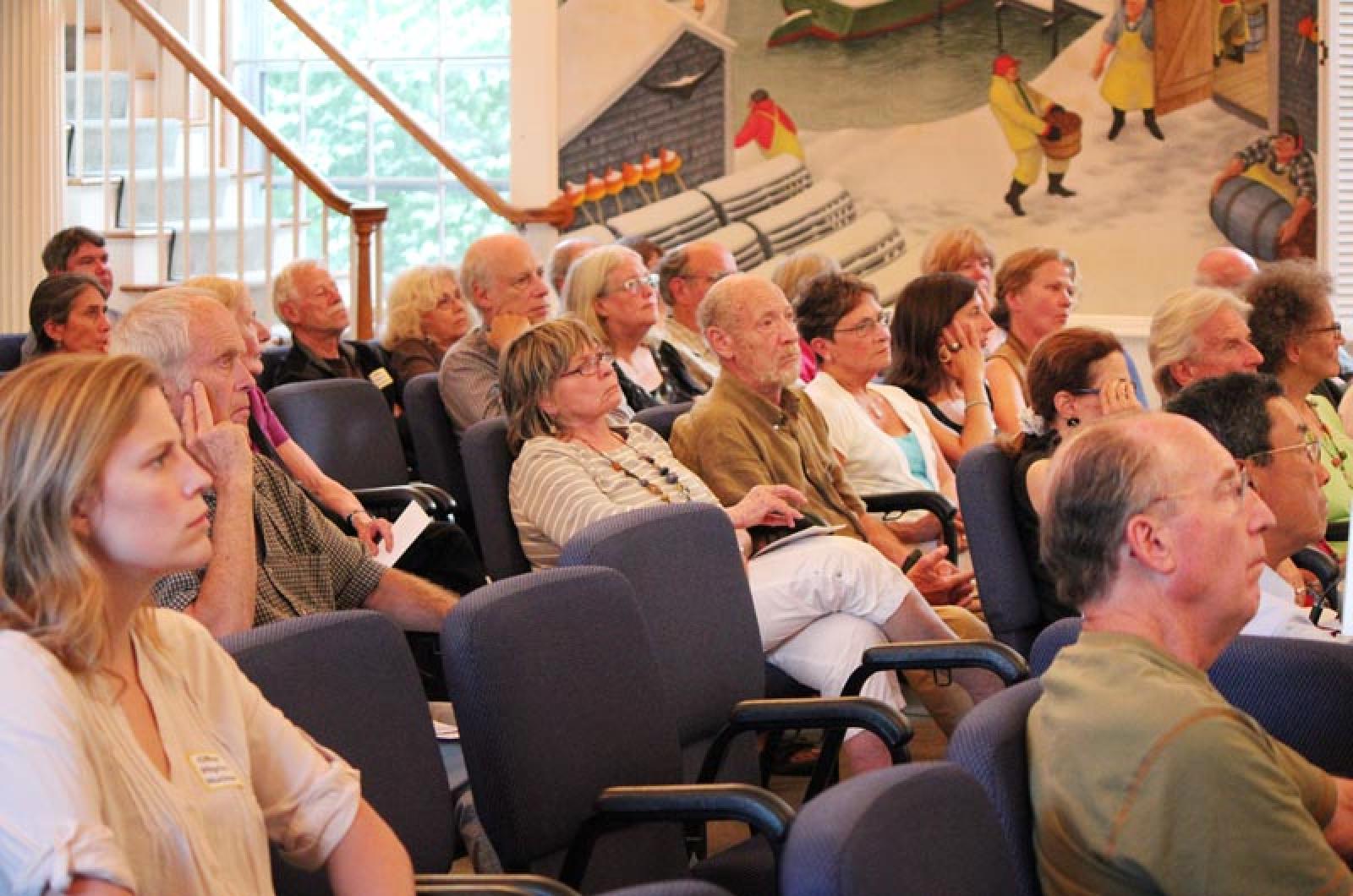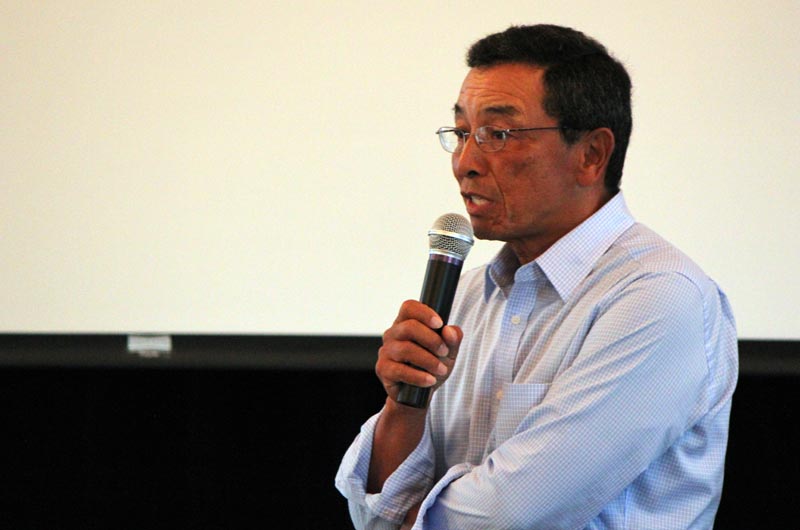The safety of the Pilgrim Nuclear Power Station in Plymouth was a topic for discussion early this week when activisits from the Cape who want to close the plant brought their cause to the Island.
“Fukushima was clearly a wake-up call,” said Mary Lampert, director of Pilgrim Watch, an advocacy group based in Plymouth. Pilgrim and Fukushima shared the same design, she said. “So the concept that it cannot happen here is a mistake.”
Representatives from three Cape Cod groups calling for the closure of the Pilgrim plant spoke Monday at a public forum at the Katharine Cornell Theatre organized by 350 Martha’s Vineyard Island, an offshoot of the national 350.org movement started by author Bill McKibben in 2008.
Efforts to have Pilgrim decommissioned gained speed following the meltdown of three reactors at the Fukushima Nuclear Power Plant in 2011 and the Nuclear Regulatory Commission’s decision in 2012 to extend Pilgrim’s operating license for another 20 years.
Much of the recent criticism surrounding the plant has focused on the state and federal evacuation plans in place in the event of an accident.
Diane Turco, co-founder the Cape Downwinders, said at the forum that since Cape Cod and the Islands are outside of the 10-mile emergency evacuation zone surrounding the plant, residents in those areas would need to “shelter in place,” and would not be allowed to immediately evacuate.
She presented documents from the Massachusetts Emergency Management Agency showing that the Bourne and Sagamore bridges would be closed to traffic during an evacuation, leaving Cape and Island residents stranded.
MEMA director Kurt Schwartz told the Gazette for a story last week that in the event of an accident at Pilgrim, residents of the Cape and Islands would be in danger from ingesting radioactive particles over time, but that ingestion at that distance was not an immediate threat. He said state and federal officials would map the regions of high radioactivity and determine whether some residents needed to relocate. Mr. Schwartz was unable to attend the forum.
Ms. Lampert said on Monday that after one day, the radioactive plume at Fukushima extended much farther than 10 miles from the plant. She said that depending on wind currents, a similar incident at Pilgrim could present an immediate risk for the Cape and Islands.
The four presenters looked at a wide range of safety issues surrounding the plant, including waste storage, the danger to marine organisms and challenges associated with climate change and rising sea levels.
Karen Vale of Cape Cod Bay Watch said a warming ocean could affect the plant’s cooling system, which uses sea water. (Pilgrim’s EPA permit to operate that type of system has been expired for 18 years.) She said the plant’s seaside location makes it more vulnerable to storms and sea surges than other reactors on the East Coast.
Panelists criticized the plant’s waste storage procedures. Storage pools that were originally designed to hold 880 spent fuel rod assemblies now contain around 4,000 assemblies, which Ms. Lampert said increases the risk of fire. Ms. Vale said a new dry-cask storage facility near the plant is being built too close to the shore.
State Sen. Dan Wolf, who represents 11 Cape towns and the two Islands, and founded Cape Air in 1988, said he learned to fly airplanes on the Cape 37 years ago and views Pilgrim through the eyes of a pilot and engineer.
Pointing out what he sees as the plant’s many design flaws, he said the roof of the reactor is designed to give under pressure, so an explosion within the plant would go up rather than out. He said that makes the plant highly susceptible to an air attack, and that no preventive measures have been taken.
“We should all understand that that’s a vulnerability,” Mr. Wolf said. “As I flew over the plant today, I’m looking at it and I’m thinking, Wow, this is really kind of insane.”
Senator Wolf is one of several state officials — including Gov. Deval Patrick, Cong. Ed Markey and Sen. Elizabeth Warren — who have encouraged the NRC in writing to close the plant if its safety cannot be improved. But he said letters were not enough.
“Whatever it takes to get that plant decommissioned over time and shut down over time is the right thing to do,” he said.
In light of the plant’s expired clean water permit, Mr. Wolf is petitioning the EPA to require that Pilgrim adopt a closed-cycle cooling system, “which we hope would drive the expenses up and make [the plant] economically unviable.”
Ms. Turco cited written correspondences between Governor Patrick and NRC chairman Allison Macfarlane from this year. She said that in a letter dated June 9, Ms. Macfarlane suggested that the state plays a bigger role in determining the adequacy of the plant’s emergency response plan than many previously thought. “The commonwealth of Massachusetts has the overall authority for making protective action decisions (e.g., sheltering and evacuation) to ensure the safety of Massachusetts residents during a radiological event. In addition, the Massachusetts Emergency Management Agency maintains the FEMA-approved state radiological emergency plan for implementing those decisions,” the letter said in part.
“That letter is a very powerful letter,” Mr. Wolf said, noting that a “valid, approved emergency response plan” is required for a nuclear plant to operate.
“I think Macfarlane’s letter is basically saying to the commonwealth of Massachusetts, ‘If you want to shut this plant down, we’re not going to get in your way,’” he said. He added that he was in the process of contacting other state officials, including Mr. Schwartz, to encourage them to more fully utilize their influence.
At annual town meetings this year, all 15 Cape towns, and most towns on the Vineyard passed nonbinding resolutions asking for Pilgrim’s closure. A petition circulating at Monday’s forum asked Senator Wolf to develop legislation to expand the 10-mile evacuation zone to include the Cape and Islands.









Comments (3)
Comments
Comment policy »